News
 In The News
In The News On the Road to IMF Governance Reform
On the Road to IMF Governance Reform
On the Road to IMF Governance Reform
October 2, 2009
iMFdirect – The International Monetary Fund’s Global Economy Forum
Blog by Caroline Atkinson
There has been talk for years of the need for IMF governance reform by critics of the IMF. Now it is on the official agenda–and some of the civil society organizations (CSOs) who have been most interested and vocal on the subject have been participating in the debate with the IMF. Managing Director Dominique Strauss-Kahn held a small meeting with civil society representatives from around the world–the final step of the so-called Fourth Pillar process.
The name, the Fourth Pillar, had a reason. Strauss-Kahn invited the CSOs to supplement the other three “pillars” who were submitting reports to the IMF on its governance–the IMF’s Independent Evaluation Office, the Executive Board Working Group on IMF Corporate governance, and an independent panel chaired by then South African Finance Minister Trevor Manuel.
The gathering on October 1 in Istanbul, ahead of the IMF’s Annual Meetings, was the culmination of a five-month consultation with civil society organizations. The Fourth Pillar representatives, chaired by Jo Marie Griesgraber of the Washington-based New Rules for Global Finance coalition, presented their final report to the Managing Director–which they had earlier discussed with the IMF Executive Board.

;Jo Marie Griesgraber (l), Executive Director of New Rules for
Global Finance Coalition, chairs meeting attended by IMF
Managing Director Dominique Strauss-Kahn (c), First Deputy Managing
Director John Lipsky in Istanbul (photo: Stephen Jaffe/IMF)
The mood at this week’s meeting was clearly helped by coming right after the G-20 agreement in Pittsburghthat called for shifting IMF country weightings toward dynamic emerging market and developing countries (from over- to under-represented countries). And while CSOs made it clear at the meeting that they expect much more, they recognized that some progress is being made.
A historic step
Strauss-Kahn welcomed the report and told CSOs that the Fourth Pillar will have an impact: indeed CSO suggestions are already being considered. But he acknowledged that of course change may “not be at a pace you want.”
CSO representatives emphasized three areas in their presentations: changing quotas and the distribution of seats on the IMF Executive Board; introducing a double majority in Board voting procedures; and strengthening Fund accountability for programs in borrowing countries and Executive board accountability. A more detailed account of the meetings will be posted later on the Fund’s website.
Responding to concerns
The Fourth Pillar was originally proposed by the IMF in response to requests from CSOs for a role in the Fund’s governance reform process. Under this process, CSOs, academics, and analysts submitted recommendations and information three times, including the final report. Their deliberations were conducted through a website and international videoconferences facilitated by Fund staff. Although Thursday’s meeting was the final step in the Fourth Pillar process, the debates and discussions will continue.
